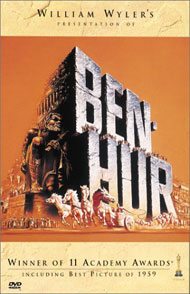
Ben-Hur
(1959)

Rated: G
Runtime: 3 Hours and 32 Minutes
Reviewer: Dale
Grade: A+I know that it's something of a cliche to say this, but this is definitely the kind of movie they don't make anymore. Tons of extras, over three hours long, grand spectacle and scenes of heartpounding intensity. Actually, they do make movies like this once in a while. Every so often, Hollywood produces a glorious piece of entertainment like "Braveheart" or the astounding "Titanic" which is in line with all of its old ways, all the old fashioned, bigger than life pageantry that it once did every year.
They just don't make them that often. And they seldom make them this good.
"Ben Hur" is an epic of the highest caliber. It is easily the best of the Biblical epics produced during the 1950's, and its eleven Oscars were well-earned and very much deserved. The film opens with the birth of Jesus. Right there, you know that you are in for something of some scope.
Flash forward thirty years. We meet Judah Ben Hur (played very effectively by Charlton Heston). Judah is one of the most prestigious men in Judea and has great influence among the people there. He is also old friends with the new tribune who Caeser has appointed, Messala. The two of them have not seen one another in years, and their reunion is happy for a time. When they begin to discuss politics, however, we soon see that things have changed since they were boys. Messala is boastful of the great things about the Roman Empire while Ben Hur believes that the Roman Empire is evil and means to destroy the heritage of his people. Yet he still feels a kinship toward Messala.
Then there is an accident that injures the region's new governor. Ben Hur is blamed, especially in light of his views on all things Roman. His sister and mother are condemned to the dungeons of Judea while Ben Hur is made a galley slave. He spends three years chained to an oar until one day he saves the life of a Roman general (Jack Hawkins) and is made a charioteer. He grows in the general's affections until he is one day named as the man's son.
Ben Hur is grateful, but he must return to Judea. He wants to see his mother and sister freed.
He would also like to gain his revenge upon Messala.
"Ben Hur" is an excellent movie. It is three and a half hours long, but it moves like nobody's business. It is a great exploration of themes like friendship and betrayal and revenge and the way that a man deals with all of the horrible things that happen in his life. It is about having faith and hope, losing them, and then the process through which one regains them. It is about the dangers of letting hatred run and ruin your life and it is about what there is to be done to purge this hatred. It also brings up the question: is any amount of revenge ever enough? Will there ever be enough to satisfy the wrongs that have been done to you?
The performances, as a whole, are first rate. There are several scenes where you can spot the models and the processed shots, but you have to understand that this was the Fifties. You have to be a little forgiving. The chariot race, however, has lost nothing over the years. It makes ninety-eight percent of all other action sequences look positively dead. The camera brings you right inside the action of the chariot race, giving you the sense that you are there, right in the thick of it. The stuntwork, the very physics of the chariot race are compelling, but even the best action scene would not make a bit of difference if we did not care about the characters. Since we do, we are even closer to the edge of our seats, thrilled by every turn the chariot takes and uneasy at the thought that the last overturned chariot has not yet been cleared from the track.
A lot has been made of the chariot race, but the entire movie is an impressive achievement. It has a few moments of clunky dialogue, but they are not enough to draw you out of the spellbinding mood and momentum that the film has created and they are definitely not as bad as the lame-ass dialogue in "The Ten Commandments". Oy! Don't even get me started on that one.
Another thing I really liked about the film was the way it shows the effects of Jesus upon the region. It does not follow Jesus or his disciples too closely, but instead allows you to hear the people of the region talking about him as they would be. You see how he affected the lives of ordinary people, not just the people who travelled with him. You see how he gave them hope, how he transformed their lives, how he started them thinking. You see his effect on Ben Hur also, and it is much more poignant because, by this point, we have spent the entire movie with this man, we have gotten to know him quite well. So when the events of the ending affect him, we care about their effects. We are interested.
The film is serious about its subjects and takes them to heart. This helps a lot. It is very easy to tell when a director's heart is not beating in the work. Here, it lurks beneath the surface of every frame. The compelling nature of the story makes "Ben Hur" good. The heart and care with which it was constructed make it a masterpiece.
